The Garage Body Shop Equipment Market is estimated to be valued at USD 4.7 billion in 2025 and is projected to reach USD 8.0 billion by 2035, registering a compound annual growth rate (CAGR) of 5.4% over the forecast period.
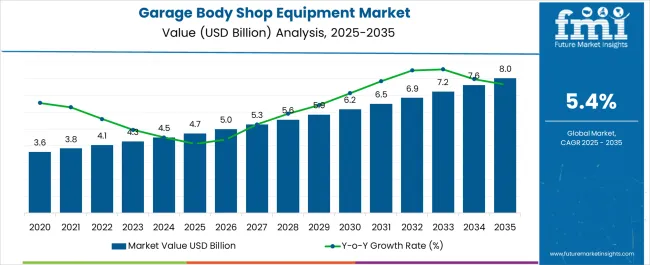
| Metric | Value |
|---|---|
| Garage Body Shop Equipment Market Estimated Value in (2025 E) | USD 4.7 billion |
| Garage Body Shop Equipment Market Forecast Value in (2035 F) | USD 8.0 billion |
| Forecast CAGR (2025 to 2035) | 5.4% |
The Garage Body Shop Equipment market is witnessing sustained growth, driven by increasing demand for automotive maintenance, repair, and refurbishment services worldwide. Expansion of the automotive sector, particularly in emerging markets, has fueled the need for modern garage equipment that enhances service efficiency, safety, and precision. Investments in dealership workshops and independent repair centers are supporting adoption of technologically advanced equipment capable of handling complex repair and maintenance tasks.
Integration of digital diagnostic tools, automated lifting systems, and modular repair platforms is further improving operational efficiency. Regulatory compliance related to workplace safety and environmental standards is also encouraging adoption of high-quality, standardized equipment. Growing emphasis on reducing vehicle downtime and improving service throughput is driving the demand for equipment that supports faster and safer repair operations.
As automotive fleets expand and the complexity of vehicles increases, the garage equipment market is positioned for sustained growth Ongoing innovations in equipment design, durability, and automation continue to create opportunities for service centers and dealerships to enhance operational capabilities while improving customer satisfaction.
The garage body shop equipment market is segmented by product type, garage type, vehicle type, sales channel, and geographic regions. By product type, garage body shop equipment market is divided into Lifting Equipment, Dent & Damage Removal, Surface Finish, and Others. In terms of garage type, garage body shop equipment market is classified into Automotive OEM Dealerships, Franchise Stores, and Independent Garages. Based on vehicle type, garage body shop equipment market is segmented into PCV And LCV, Two Wheeler, and HCV. By sales channel, garage body shop equipment market is segmented into OEM (Original Equipment Manufacturer) and Aftermarket. Regionally, the garage body shop equipment industry is classified into North America, Latin America, Western Europe, Eastern Europe, Balkan & Baltic Countries, Russia & Belarus, Central Asia, East Asia, South Asia & Pacific, and the Middle East & Africa.
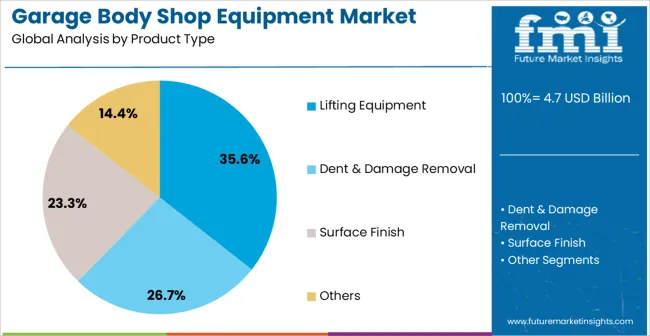
The lifting equipment product type segment is projected to hold 35.6% of the market revenue in 2025, establishing it as the leading product type. Growth is being driven by the essential role of lifting systems in vehicle maintenance and repair operations, enabling safe and efficient access to undercarriages and structural components. Lifting equipment supports a wide range of repair tasks, including engine work, suspension servicing, and alignment operations, making it indispensable in modern garages.
Advanced hydraulic and electric lifting systems offer precise control, reliability, and safety, increasing their adoption among dealerships and independent repair centers. Integration with diagnostic and workshop management tools further enhances operational efficiency and workflow standardization.
The ability to handle multiple vehicle types and weights adds to the versatility and appeal of lifting equipment As service centers prioritize safety, speed, and operational efficiency, the lifting equipment segment is expected to maintain its leading position, supported by continuous innovation in technology, durability, and compatibility with modern vehicle designs.
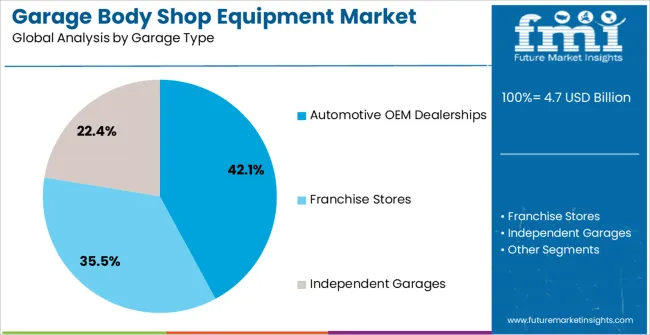
The automotive OEM dealerships garage type segment is anticipated to account for 42.1% of the market revenue in 2025, making it the leading garage type. Growth is being driven by the expansion of dealership networks and the need for standardized, high-quality service operations. Dealerships rely on specialized garage setups that integrate advanced equipment, digital diagnostic tools, and structured workflows to ensure consistent service quality and regulatory compliance.
Investments in employee training and state-of-the-art workshop infrastructure further support adoption. The ability to handle high service volumes efficiently, while maintaining safety and operational standards, reinforces the segment’s market leadership.
Dealership garages also benefit from integration with manufacturer-maintained inventory systems, parts management, and software-driven maintenance scheduling, improving turnaround times and customer satisfaction As automotive markets continue to grow and vehicles become more technologically complex, the reliance on OEM-standard garage setups is expected to remain strong, ensuring continued leadership of this segment in terms of revenue share.
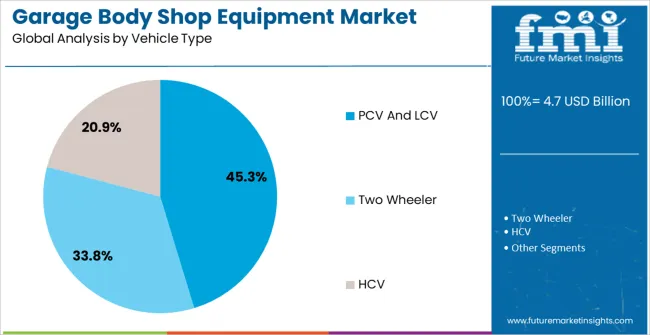
The PCV and LCV vehicle type segment is projected to hold 45.3% of the market revenue in 2025, establishing it as the leading vehicle type. Growth is being driven by the expanding commercial vehicle sector and rising demand for passenger and light commercial transport solutions.
Maintenance and repair of PCVs and LCVs require specialized garage equipment capable of handling higher loads and diverse vehicle sizes, which has encouraged adoption of advanced lifting systems, alignment tools, and modular repair platforms. Increasing usage of PCVs and LCVs in logistics, last-mile delivery, and commercial transport operations has heightened the need for efficient and safe workshop operations.
The ability to standardize servicing processes across fleets, reduce downtime, and comply with safety regulations is enhancing operational efficiency As urbanization and e-commerce expansion continue, demand for reliable repair and maintenance services for PCVs and LCVs is expected to increase, supporting sustained growth of this vehicle type segment within the garage body shop equipment market.
Automotive garage body shop equipment refers to technical tools used to repair vehicles by which the vehicle is easily accessible for repair and maintenance operations. Vehicle maintenance, repairs and operations (MRO) can be easily done by the use of garage body shop equipment.
Maintenance services such as repairing damages, repainting, removing dents as well as overhauling highly damaged automobiles caused by major road accident can be made easier by the use of garage body shop equipment in the global market. The emerging economies where the vehicle production is in high demand is dominated by local garage workshops.
The trend of hi-tech specialty mobile van garages is also picking up pace in this regions and the market for automotive garage body shop equipment is also continuously evolving. The replacement of damaged or un-operational auto-components is one of the major driving factors for the impelling growth of garage body shop equipment and its expansion is directly proportional to vehicle production in the global market.
Recent research, development and innovation coupled with the technological advancement and improvements for manufacturing lifting equipment which can carry higher payloads with sleek and compact design is acting a catalyst for the growth of global garage body shop equipment market.
Furthermore, the advancement in the automation industry (driven by growing population and hence higher disposable income as well as good standard of living) also motivate the growth of the global Garage Body Shop Equipment market
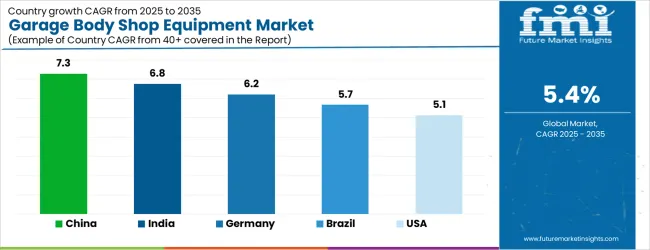
| Country | CAGR |
|---|---|
| China | 7.3% |
| India | 6.8% |
| Germany | 6.2% |
| Brazil | 5.7% |
| USA | 5.1% |
| UK | 4.6% |
| Japan | 4.1% |
The Garage Body Shop Equipment Market is expected to register a CAGR of 5.4% during the forecast period, exhibiting varied country level momentum. China leads with the highest CAGR of 7.3%, followed by India at 6.8%. Developed markets such as Germany, France, and the UK continue to expand steadily, while the USA is likely to grow at consistent rates. Japan posts the lowest CAGR at 4.1%, yet still underscores a broadly positive trajectory for the global Garage Body Shop Equipment Market. In 2024, Germany held a dominant revenue in the Western Europe market and is expected to grow with a CAGR of 6.2%. The USA Garage Body Shop Equipment Market is estimated to be valued at USD 1.7 billion in 2025 and is anticipated to reach a valuation of USD 1.7 billion by 2035. Sales are projected to rise at a CAGR of 0.0% over the forecast period between 2025 and 2035. While Japan and South Korea markets are estimated to be valued at USD 257.1 million and USD 126.9 million respectively in 2025.
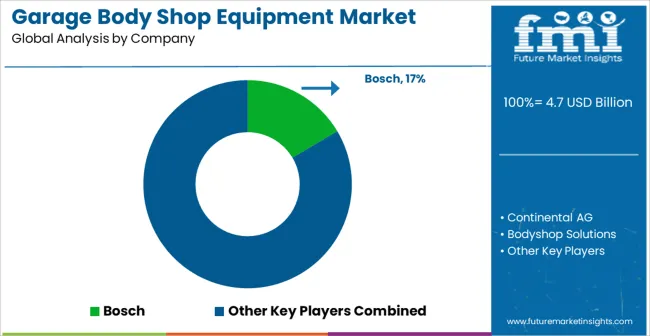
| Item | Value |
|---|---|
| Quantitative Units | USD 4.7 Billion |
| Product Type | Lifting Equipment, Dent & Damage Removal, Surface Finish, and Others |
| Garage Type | Automotive OEM Dealerships, Franchise Stores, and Independent Garages |
| Vehicle Type | PCV And LCV, Two Wheeler, and HCV |
| Sales Channel | OEM (Original Equipment Manufacturer) and Aftermarket |
| Regions Covered | North America, Europe, Asia-Pacific, Latin America, Middle East & Africa |
| Country Covered | United States, Canada, Germany, France, United Kingdom, China, Japan, India, Brazil, South Africa |
| Key Companies Profiled | Bosch, Continental AG, Bodyshop Solutions, Steck Manufacturing Company, Spanesi S.p.A., Siemens AG, ELGi, Manatec Electronics Private Limited, Madhus Garage Equipment, LKQ Coatings, and Boston Garage Equipment |
The global garage body shop equipment market is estimated to be valued at USD 4.7 billion in 2025.
The market size for the garage body shop equipment market is projected to reach USD 8.0 billion by 2035.
The garage body shop equipment market is expected to grow at a 5.4% CAGR between 2025 and 2035.
The key product types in garage body shop equipment market are lifting equipment, dent & damage removal, surface finish and others.
In terms of garage type, automotive oem dealerships segment to command 42.1% share in the garage body shop equipment market in 2025.






Our Research Products

The "Full Research Suite" delivers actionable market intel, deep dives on markets or technologies, so clients act faster, cut risk, and unlock growth.

The Leaderboard benchmarks and ranks top vendors, classifying them as Established Leaders, Leading Challengers, or Disruptors & Challengers.

Locates where complements amplify value and substitutes erode it, forecasting net impact by horizon

We deliver granular, decision-grade intel: market sizing, 5-year forecasts, pricing, adoption, usage, revenue, and operational KPIs—plus competitor tracking, regulation, and value chains—across 60 countries broadly.

Spot the shifts before they hit your P&L. We track inflection points, adoption curves, pricing moves, and ecosystem plays to show where demand is heading, why it is changing, and what to do next across high-growth markets and disruptive tech

Real-time reads of user behavior. We track shifting priorities, perceptions of today’s and next-gen services, and provider experience, then pace how fast tech moves from trial to adoption, blending buyer, consumer, and channel inputs with social signals (#WhySwitch, #UX).

Partner with our analyst team to build a custom report designed around your business priorities. From analysing market trends to assessing competitors or crafting bespoke datasets, we tailor insights to your needs.
Supplier Intelligence
Discovery & Profiling
Capacity & Footprint
Performance & Risk
Compliance & Governance
Commercial Readiness
Who Supplies Whom
Scorecards & Shortlists
Playbooks & Docs
Category Intelligence
Definition & Scope
Demand & Use Cases
Cost Drivers
Market Structure
Supply Chain Map
Trade & Policy
Operating Norms
Deliverables
Buyer Intelligence
Account Basics
Spend & Scope
Procurement Model
Vendor Requirements
Terms & Policies
Entry Strategy
Pain Points & Triggers
Outputs
Pricing Analysis
Benchmarks
Trends
Should-Cost
Indexation
Landed Cost
Commercial Terms
Deliverables
Brand Analysis
Positioning & Value Prop
Share & Presence
Customer Evidence
Go-to-Market
Digital & Reputation
Compliance & Trust
KPIs & Gaps
Outputs
Full Research Suite comprises of:
Market outlook & trends analysis
Interviews & case studies
Strategic recommendations
Vendor profiles & capabilities analysis
5-year forecasts
8 regions and 60+ country-level data splits
Market segment data splits
12 months of continuous data updates
DELIVERED AS:
PDF EXCEL ONLINE
Garage Equipment Market Forecast and Outlook 2025 to 2035
Tipper Body Equipment Market Size and Share Forecast Outlook 2025 to 2035
Automotive Garage Equipment Market Size and Share Forecast Outlook 2025 to 2035
Body Armor Plates Market Size and Share Forecast Outlook 2025 to 2035
Body Composition Monitor and Scale Market Size and Share Forecast Outlook 2025 to 2035
Equipment Management Software Market Size and Share Forecast Outlook 2025 to 2035
Body Tape Market Size and Share Forecast Outlook 2025 to 2035
Equipment cases market Size and Share Forecast Outlook 2025 to 2035
Body Blurring Cosmetics Market Size and Share Forecast Outlook 2025 to 2035
Body Contouring Market Size and Share Forecast Outlook 2025 to 2035
Body Fat Reduction Market Growth - Trends & Forecast 2025 to 2035
Body Armor Market Analysis - Size, Share & Forecast 2025 to 2035
Garage and Service Station Market Trends - Growth & Forecast 2025 to 2035
Body-Worn Temperature Sensors Market Analysis by Type, Application, and Region through 2025 to 2035
Body Fat Measurement Market Analysis - Trends, Growth & Forecast 2025 to 2035
Body Slimming Devices Market Analysis by Product, End-User and Region through 2035
Leading Providers & Market Share in Body Augmentation Fillers
Body Firming Creams Market Growth & Forecast 2025-2035
Body Luminizer Market Trends & Forecast 2025 to 2035
Body Scrub Market Growth & Forecast 2025 to 2035

Thank you!
You will receive an email from our Business Development Manager. Please be sure to check your SPAM/JUNK folder too.
Chat With
MaRIA